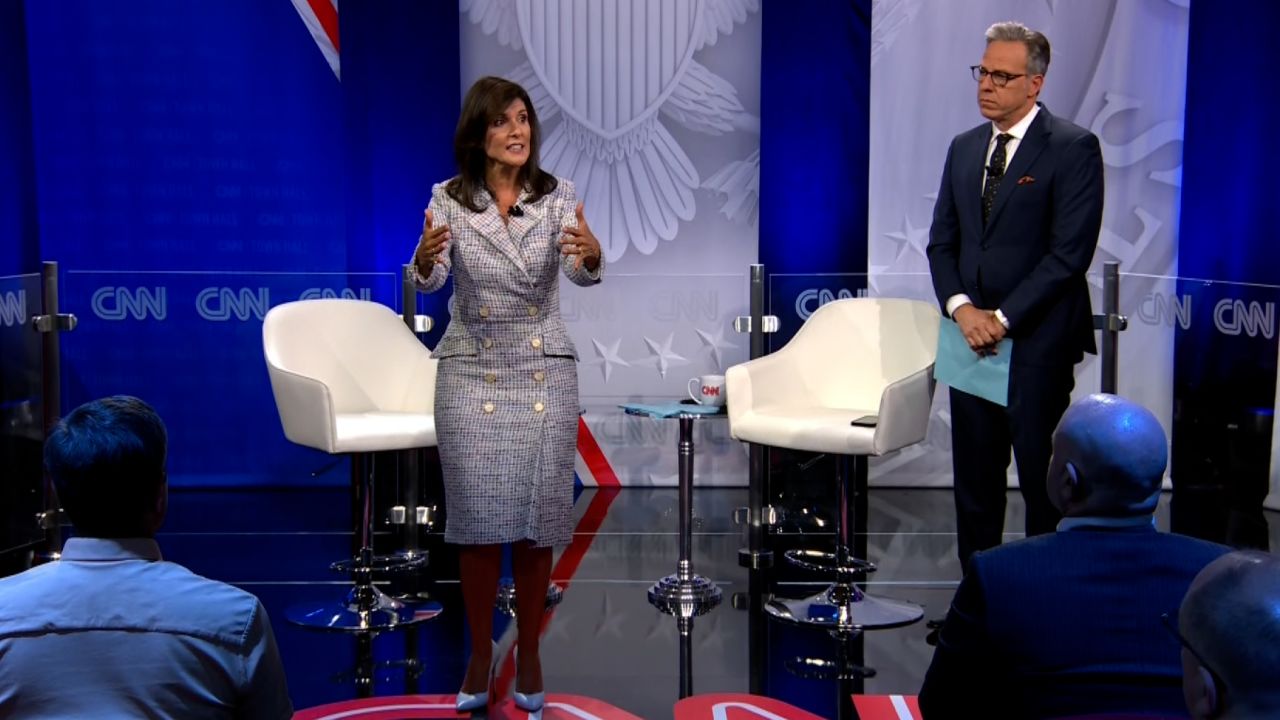Editor’s note: Patrick T. Brown is a fellow at the Ethics and Public Policy Center, a conservative think tank and advocacy group based in Washington, DC. He is also a former senior policy adviser to Congress’ Joint Economic Committee. Follow him on?Twitter. The views expressed in this piece are his own. View?more opinion?on CNN.
Nikki Haley won election as Governor as South Carolina in both 2010 and 2014. If the Republican Party, whose presidential nomination she’s seeking, was still the GOP of 2010 or even 2014, she might have a strong justification for her candidacy – and a stronger chance to win.

But the past and current candidacy of Donald Trump seems to have indelibly shifted the axis of the Republican Party. And the issues that energized Haley in Sunday night’s CNN town hall showcased how much daylight there is between the era of the Tea Party and today’s populist GOP.
Many Republicans are galvanized by critical race theory, parents’ rights and LGBTQ-related controversies. Yet Haley’s professional and polished performance emphasized a message of old favorites like entitlement reform, a hawkish foreign policy and tort reform.
For the median Republican voter of a decade ago, perhaps it was everything they could want. But today’s Republican party is noticeably cool on Haley’s campaign to date – possibly because they are looking for a politician who can show she has answers for the problems of today.
Haley has been on all sides of the party’s complex relationship with former President Donald Trump – opposing him in the 2016 primary before working for his administration as US Ambassador to the United Nations, criticizing the then-President’s actions on January 6 before saying she’d defer to him rather than run for president, and then, finally, doing so anyway.
Even when offered a chance to directly criticize her former boss Sunday night, Haley largely held her fire, offering terse disagreement on January 6 before pivoting to talk about election reform, or focusing her rhetoric on the Taliban and Kim Jong Un rather than on how Trump engaged with them as president.
Instead, she tried to offer an indirect, though far from subtle, message that her candidacy offered Republicans a chance to turn the page on the Trump years. “It’s time for a new generational leader,” she stressed, telling voters that “we deserve better, you deserve better than what we have right now, and I’m determined to make that happen.”
She blamed not just President Joe Biden, but also Republicans in Washington, DC, (and, implicitly, Trump) for racking up trillions of federal spending, mentioning her support of a balanced budget and opposition to earmarks in phrases that could have been straight from Republican House Speaker Paul Ryan’s handbook.
In disagreeing with another rival, Gov. Ron DeSantis of Florida, Haley sought to position herself as offering a less polarizing style of politics. She said she “totally agree(d) with” the Florida bill dubbed “Don’t Say Gay” by its critics and even “thought that it needed to go further,” but she opposed DeSantis’ ongoing fight with the Disney corporation. “All this vendetta stuff, we’ve been down that road,” she said, trying to ding both men currently leading most polls in the race to the Republican nomination.
She also foreshadowed some attacks on her primary opponents on the issue of entitlements, embracing the need to raise the retirement age and alleging that her opponents were “not being honest with the American people.” It is politically brave to lead with the uncomfortable fiscal picture for Social Security and Medicare. But bravery rarely translates into votes, especially in a state in which approximately 22% of residents are over the age of 62.
And amid the calls for “serious conversations” and “needing to be honest,” there was a sense that Haley’s actual policy positions were still coalescing. Calling for mental health to be our “number one priority” in response to gun violence, for example, works best when you have a concrete plan to ensure coverage. It would have been fascinating to hear Haley call for legislation to make mental health coverage mandatory for insurers or propose a specific program to increase funding for community mental health care.
Even on the issue of abortion, which she has grabbed by the horns more bravely than most national Republicans, she was content to let her true preferences hide behind some realpolitik. She noted, correctly, that it is vanishingly unlikely for Republicans to have a filibuster-proof majority in the Senate – “We haven’t had 60 pro-life?senators in over 100 years,” Haley said. In lieu of that, she offered a focus on banning late-term abortions, encouraging adoptions, conscience protections for health care providers, access to contraception and not punishing women who get abortions to “save as many babies as we can…and support as many mothers as we can.”
It wasn’t until one of last answers of the night, when she talked about being a mom to a recently married daughter struggling to afford a home, and a college student who feels the need to espouse “woke” pieties to get good grades, that a more interesting version of Haley’s campaign could be glimpsed. What would her vision of governing do for couples saving for a down payment, or parents concerned about schools forcing students to think a certain way?
Get Our Free Weekly Newsletter
- Sign up for CNN Opinion’s newsletter
- Join us on Twitter and Facebook
That went unanswered; a 2010-esque approach to politics doesn’t have ready answers. But as the campaign progresses, more details on how her vision could respond to what’s on voters’ minds might do a better job of translating between principle and politics.
Haley held the stage well. She showed how adeptly she can lean into a minority woman in Republican politics without being seen as playing the identity card. The most moving minutes of the evening were her personal recollections of the moment that has become her national calling card, the removal of the Confederate flag from the State House grounds in Columbia, South Carolina, following the 2015 mass shooting at a Charleston church that claimed the lives of nine African Americans.
Unfortunately for Haley’s chances of winning the nomination, the political winds that she rode to gubernatorial reelection have shifted. Her performance Sunday night offered a view of an alternate universe in which the ideals that drove the Tea Party movement were still the driving force behind GOP politics. But – barring an unexpected shift – it seems unlikely to resonate with the voters who will make up the Republican primary electorate of 2024.


